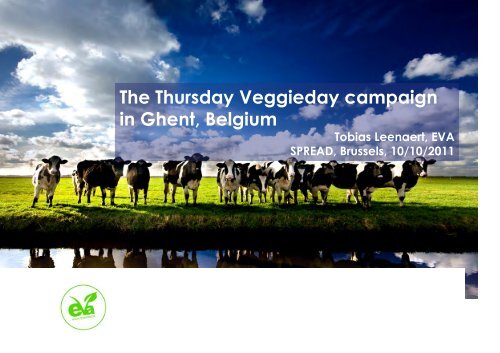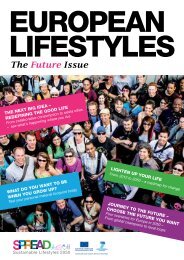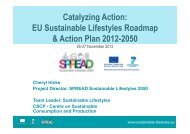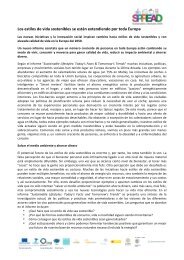Tobias Leenaert - SPREAD Sustainable Lifestyles 2050
Tobias Leenaert - SPREAD Sustainable Lifestyles 2050
Tobias Leenaert - SPREAD Sustainable Lifestyles 2050
Create successful ePaper yourself
Turn your PDF publications into a flip-book with our unique Google optimized e-Paper software.
The Thursday Veggieday campaign<br />
in Ghent, Belgium<br />
<strong>Tobias</strong> <strong>Leenaert</strong>, EVA<br />
<strong>SPREAD</strong>, Brussels, 10/10/2011<br />
<strong>Tobias</strong> <strong>Leenaert</strong>, EVA vzw
Environmental<br />
Food security<br />
Health<br />
Animal welfare
19 billion farm animals at every moment<br />
55 billion per year
Slimme hond video<br />
Slimme kraai<br />
Slimme big
A lot goes in, a lot comes out
Input<br />
We feed 7 billion<br />
people with<br />
55 billion animals<br />
But what do we<br />
need to feed<br />
them
40% of all grain
76% of all agricultural land<br />
or 29% of our planet’s land<br />
mass
15.000 liters of water for one kg of beef
Protein yield per hectare<br />
Soy (162 kg)<br />
Rice (118 kg)<br />
Bron: USDA<br />
FAO/WHO/UNICEF<br />
Protein advisory group<br />
Corn (96 kg)<br />
Other legumes (87kg)<br />
Wheat (73kg)
Plant > animal<br />
7 to10 kg grain per kg beef<br />
4 to 5.5 kg grain per kg pork<br />
2 to 3 kg grain per kg chicken
How to feed the world in <strong>2050</strong><br />
! 9 billion people<br />
! 50 to 100% food production increase
With the following challenges:<br />
- Land scarcity<br />
- Water scarcity<br />
- Climate change<br />
- Peak oil Peak phosphorus<br />
Taking into account:<br />
- Health costs<br />
- Conscious consumer
Output
“The livestock sector emerges as one of<br />
the top two or three most significant<br />
contributors to the most serious<br />
environmental problems, at every scale<br />
from local to global.”<br />
FAO 2006
Deforestation: Belgium every year
Tomorrow
Less meat:<br />
The question is not why<br />
But how
Challenges<br />
! Government is reluctant to interfere (private matter<br />
+ economic interests)
Challenges<br />
! Animal products are omnipresent in our lives;<br />
alternatives aren’t, yet
Challenges<br />
! Large lack of knowledge concerning the problem,<br />
both in theory and practice
Challenges<br />
! ‘Less meat’ is easily interpreted as ‘no meat’
EVA: translating an important but difficult<br />
message to something fun and doable
! Feasible, low treshold<br />
! Effective<br />
! Challenging & fun<br />
! Sticky<br />
! Tasty
in Ghent
! Cooperation between:<br />
! EVA<br />
! Ghent Environmental department<br />
! Ghent Health department<br />
! Ghent Educational department<br />
! Commercial sponsor (Alpro soya)<br />
! Responsible from city side: councilman for<br />
the environment Tom Balthazar
Official proclamation, May 2009
140.000 veggie street maps
Guides for restaurants & chefs
Recipe booklets
Campaign in schools
Results (iVOX, March 2011)<br />
Ghent Flanders<br />
Participate at least once a month 30% 17%<br />
Participate Weekly 19% 13%<br />
Will try 43% 42%<br />
Is aware of the campaign 67% 30%<br />
Ate less meat because of the campaign 15% 13%
Tasty food
Positive energy
Creativity
some seduction
St.-Pietersnieuwstraat 130<br />
9000 Gent, Belgium<br />
www.evavzw.be – www.donderdagveggiedag.be<br />
info@evavzw.be – 09/329.68.51





![closing conference report [PDF] - SPREAD Sustainable Lifestyles ...](https://img.yumpu.com/42874652/1/184x260/closing-conference-report-pdf-spread-sustainable-lifestyles-.jpg?quality=85)

